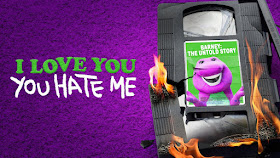Barney & the Backyard Gang is an American direct-to-video series produced by The Lyons Group and released in periodic installments from August 29, 1988, to September 21, 1991. The series' success led to the launch of the children's television show, Barney & Friends, which in its original run aired on PBS from April 6, 1992, to November 2, 2010. The Emmy-winning series lasted for 14 seasons and was nominated for fifteen Emmys by the end of its run.
However, while the show ran for 268 episodes on the PBS network, the show faced extreme criticism despite its efforts to uplift, educate, motivate and entertain its viewers at home.
"Anti-Barney humor" targeted Barney the Dinosaur, and singles out the show for its quirks. The backlash was Anything but funny as described in the 2 part documentary, I Love You, You Hate Me.
The documentary series explored the life and legacy of the popular children's television character. Released on Peacock, the series delves into the cultural phenomenon surrounding Barney, examining both the affection he inspired in children and the backlash he received from some adults. It features interviews, archival footage, and personal stories that highlight the contrasting feelings people have about the character and the impact of the show on society. The series also addresses themes of nostalgia, childhood, and the complexities of fame.
The "Barney backlash" was huge despite the show promoting positive values such as friendship, sharing, and kindness.
Cultural Critique was a big part of the problem. Some parents and critics felt that Barney’s overly cheerful and simplistic messages were unrealistic and did not reflect the complexities of real-life interactions. This led to accusations that the show was too sanitized and did not prepare children for the challenges of the world.
Highly disturbing? You bet! Why is it that when public figures (or anyone of that matter) trys to spread messages of love, peace and hope, there is the negative response. Barney has experienced the trauma of many like: Martin Luther King, Jr., Michael Jackson and even the biblical, Jesus Christ. Barney may as well been nailed to a cross.
Commercialization was another issue.
The extensive merchandising associated with Barney, including toys, clothing, and videos, drew criticism. Some argued that the focus on profit undermined the educational intentions of the show, making it seem more about commercial gain than children's development.
As the internet grew, Barney became a target for parody and memes, often portraying the character in negative or mocking ways. This shift in public perception turned the character from a beloved childhood figure into a symbol of annoyance or ridicule for some, distancing the original positive messages.
As new children's programs emerged, some parents who grew up with Barney began to view it as outdated. This generational shift led to mixed feelings about the show's relevance and effectiveness, contributing to the backlash.
This backlash can be seen as indicative of deeper societal issues that have always existed in society. Such as discomfort with unabashed positivity, nostalgia for a more cynical worldview, or even a reaction against the commercialization of childhood. The strong emotional responses to a children's show suggest that people's perceptions of childhood and innocence can provoke intense feelings, revealing underlying anxieties about societal values, parenting, and cultural norms.
In essence, while "Barney" was aimed at fostering kindness and friendship among children, the backlash illustrated a segment of the population that found such messages either off-putting or emblematic of a perceived decline in cultural standards, showcasing a tension between innocence and a more jaded adult perspective.



.webp)


.jpg)

.jpg)
No comments:
Post a Comment